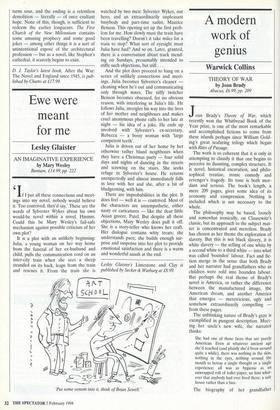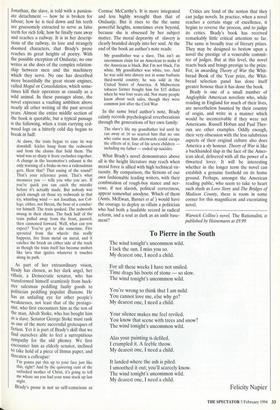A modern work of genius
Warwick Collins
THEORY OF WAR by Joan Brady Abacus, £6.99, pp. 209 Joan Brady's Theory of War, which recently won the Whitbread Book of the Year prize, is one of the most remarkable and accomplished fictions to come from these islands perhaps since William Gold- ing's great seafaring trilogy which began with Rites of Passage.
The work is so coherent that it is only in attempting to classify it that one begins to perceive its daunting, complex structure. It is novel, historical excavation, and philo- sophical treatise, ironic comedy and revenger's tragedy. Its tone is both mor- dant and serious. The book's length, a mere 209 pages, gives some idea of its economy and compression. Nothing is included which is not necessary to the whole.
The philosophy may be based, loosely and somewhat ironically, on Clausewitz's classic, but its approach to the subject mat- ter is concentrated and merciless. Brady has chosen as her theme the exploration of slavery. But this is not black slavery, it is white slavery — the selling of one white by a second white to a third white — into what was called 'bounden' labour. Fact and fic- tion merge in the sense that both Brady and her narrator had grandfathers who as children were sold into bounden labour. But perhaps the real theme of Brady's novel is America, or rather the difference between the manufactured image, the American dream, and another America that emerges — meretricious, ugly and somehow extraordinarily compelling from these pages.
The unblinking nature of Brady's gaze is exemplified in pungent description. Meet- ing her uncle's new wife, the narrator thinks:
She had one of those faces that are purely American. Even at whatever ancient age she'd reached (and plainly she'd been around quite a while), there was nothing in the skin, nothing in the eyes, nothing around the mouth to betray a single thought or a single experience; all was as hygienic as an unwrapped roll of toilet paper, no hint what- ever that anybody had ever lived there: a safe house rather than a face.
The biography of her grandfather
Jonathan, the slave, is told with a passion- ate detachment — how he is broken for labour; how he is tied down and his teeth are gruesomely extracted to serve as false teeth for rich folk; how he finally runs away and reaches a railway. It is in her descrip- tions of the railway, its lore and strangely doomed characters, that Brady's prose reaches its great heights of poetry. With the possible exception of Ondaatje, no one writes as she does of the complex relation- ship between men and the machinery which they serve. No one has described more beautifully the great steam engines, called Mogul or Consolidation, which some- times kill their operators as casually as a wild animal. In these passages alone, the novel expresses a vaulting ambition above nearly all other writing of the past several years. Almost the entire middle section of the book is quotable, but a typical passage is the following, when a train carrying red- wood logs on a bitterly cold day begins to break in half:
At dawn, the train began to ease its way downhill. Icicles hung from the redwoods and from the chains that held them. The wind was so sharp it froze eyelashes together. A change in the locomotive's exhaust is the only warning of a brake-in-two a railroadman gets. Hear that? That easing of the sound? That's your reference point. That's what measures you — tells you who you are. If you're quick you can catch the mistake before it's actually made. But nobody was quick enough on those icy redwoods in that icy, whistling wind — not Jonathan, not Col- lege, either, not Hecox, the bear of a conduc- tor himself. The train quaked. The redwoods swung in their chains. The back half of the train pulled away from the front, paused, then cannoned forward. Well, what can you expect? You've got to die sometime. Fire sprouted from the wheels: this really happens, fire from metal on metal, and it catches the brush on either side of the track as though the train itself has become molten like lava that ignites whatever it touches along its path.
As part of her extraordinary vision, Brady has chosen, as her dark angel, her villain, a Democratic senator, who has transformed himself seamlessly from huck- ster salesman peddling faulty goods to politician peddling populist illusions. He has an unfailing eye for other people's weaknesses, not least that of the protago- nist, who first encounters him as the son of the man, Alvah Stoke, who has bought him as a slave. Senator George Stoke must rank as one of the more successful grotesques of fiction. Yet it is part of Brady's skill that we find ourselves able to feel a surreptitious sympathy for the old phoney. We first encounter him as elderly senator, inclined to take hold of a piece of litmus paper, and threaten a colleague:
I'm gonna put this up to your face just like this, right? And by the quivering cunt of the unfucked mother of Christ, it's going to tell me whose ass you had your nose stuck up last night.
Brady's prose is not so self-conscious as Cormac McCarthy's. It is more integrated and less highly wrought than that of Ondaatje. But it rises to the the same powerful heights, sometimes even beyond, because she is obsessed by her subject matter. The moral depravity of slavery is clearly branded deeply into her soul. At the end of the book an author's note reads:
My grandfather was a slave. This isn't an uncommon claim for an American to make if the American is black. But I'm not black, I'm white. My grandfather was white, too. And he was sold into slavery not in some barbaric third-world country; he was sold in the United States of America. A Midwestern tobacco farmer bought him for $15 dollars when he was four years old. Not many people know about such sales, though they were common just after the Civil War.
In the same brief author's note, Brady calmly records psychological reverberations through the generations of her own family:
The slave's life my grandfather led until he ran away at 16 so scarred him that no one who came near him afterwards could escape the effects of it; four of his seven children including my father — ended up suicides.
What Brady's novel demonstrates above all is the height literature may reach when moral force is allied with high technical vir- tuosity. By comparison, the fictions of our own fashionable leading writers, with their combination of rough-boy stance and ner- vous, if not slavish, political correctness, appear somewhat anodyne. Which of them (Amis, McEwan, Barnes et al ) would have the courage to deploy as villain a politician who had both a laudable record in radical reform, and a soul as dark as an unlit base- ment? Critics are fond of the notion that they can judge novels. In practice, when a novel reaches a certain stage of excellence, it begins to reverse the process, and to judge its critics. Brady's book has received remarkably little critical attention so far. The same is broadly true of literary prizes. They may be designed to bestow upon a novel the prestige of a venerable commit- tee of judges. But at this level, the novel reacts back and brings prestige to the prize. For, in awarding Theory of War the Whit- bread Book of the Year prize, the Whit- bread selection panel has done itself greater honour than it has done the book.
Brady is one of a small number of Anglophile American novelists who, while residing in England for much of their lives, are nevertheless haunted by their country of origin, and write in a manner which would be inconceivable if they were not Americans. Russell Hoban and Paul Ther- oux are other examples. Oddly enough, their very obsession with the less salubrious aspects of their original culture also does America a sly honour. Theory of War is like a backhanded slap in the face of the Amer- ican ideal, delivered with all the power of a thwarted lover. It will be interesting whether in the longer term the novel can establish a genuine foothold on its home ground. Perhaps, amongst the American reading public, who seem to take to heart such slush as Love Story and The Bridges of Madison County, there is room in some corner for this magnificent and excoriating novel.
Warwick Collins's novel, The Rationalist, is published by Heinemann at f9.99.



















































 Previous page
Previous page